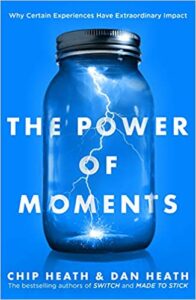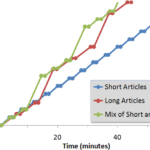Does Blog Post Length Matter to Readers? Think Duration Neglect

Opinions have always differed on the optimal size for a blog post. Having composed blog posts (as both a Say It For You ghost writer and under my own name) numbering well into the tens of thousands, I’m still finding it difficult to fix on any rule other than “It depends!”. I think maybe Albert Einstein said it best: “Make everything as simple as possible, but not simpler.”
A chapter in Chip and Dan Heath’s book The Power of Moments gave me a different perspective on that old long-short question. Research has found, the authors note, that “when people assess an experience, they tend to forget or ignore its length.” This phenomenon is called ‘duration neglect”. People tend to rate an experience based on two key factors:
- the best or worst moment (“the peak”)
- the ending
In business blog writing, Dave Taylor explains (and as we content writers in Indianapolis know), there are no editors, layout people, or government regulators to dictate the length of any marketing blog post. As a corporate blogging trainer, I felt my own approach to the subject was vindicated when Taylor cited a common piece of editorial advice about how long a book or article should be: “Write just enough to cover the material at the appropriate level of detail, then stop.” That dovetails nicely with the advice I offer when offering business blogging assistance.
The Heaths’ concept of the “peak”-and-ending, I realized, suggests a whole new way to come at the long-short question. A business blog post should be designed to elicit an “Aha!” response, that “peak” moment when readers find the advice or the offer of a product or service which seems to be the exact right thing for them. (Of course, in blogging, that realization had better happen sooner rather than later, or searchers will click away from the page!)
A big part of successful blog content writing involves getting the ”pow opening line” right. To sustain the “pow!” effect, present a question, a problem, a startling statistic, or a gutsy challenging statement. “Pow” endings, then, tie back to the openers, bringing the post full-circle.
Readers who’ve made their way to the end of a business blog post are going to remember only two things: the best moment and the ending. If they’ve had a positive experience, how long or short the post has been will have lost importance – all due to the duration neglect effect.


Follow us online!